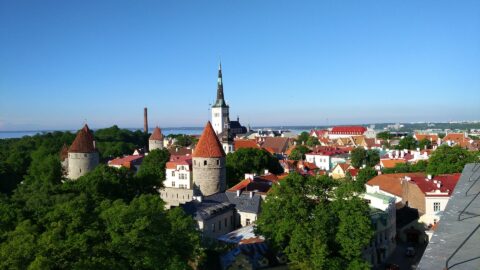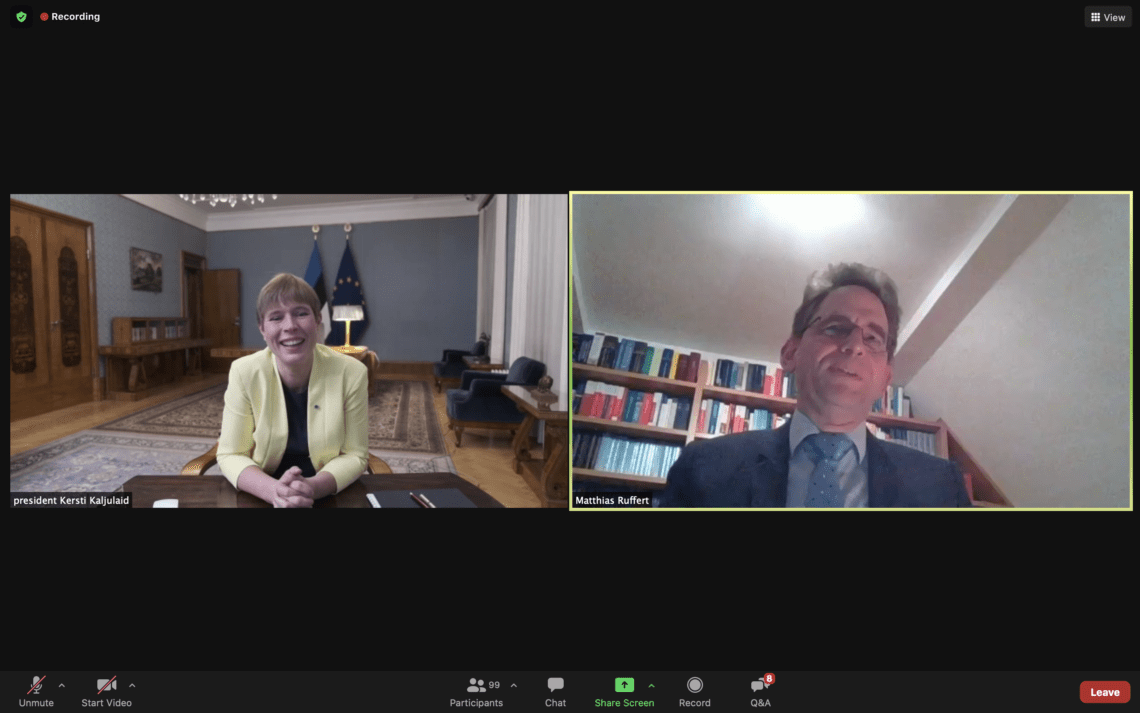By Mele Pesti
President Kersti Kaljulaid has been long campaigning for an Europe that follows the Estonian digital path and also made this the topic of her Humboldt Speech in early November. Berlin-based Estonian journalist Mele Pesti takes the speech as an opportunity to look at the Estonian approach and points out whether this could be a model for Europe.
“Oh, You are from Estonia? Amazing! I will register my first start-up also in Estonia!”
“And I already am an e-citizen of Estonia! I have never been there, but I can now legally do business there. It takes less than ten minutes to start a company in Estonia over the internet and two minutes to pay your taxes of the year!”
I am standing in the courtyard of the Factory, a coworking space in Berlin, and listen to the chit-chat of the programming students who study at CODE University of Applied Sciences, also located in the Görlitzer Park campus. I know that my home country has a reputation for having worked out quite a few well-functioning digital solutions. But I did not know that the news had travelled quite so well.
Comforts of digital life

One of the early Estonian success stories was developing a new peer-to-peer technology, a free calling service called Skype. The company has a notable legacy, helping to boost many next ideas and building a bustling tech scene into the Estonian capital Tallinn. By now there are four more ‘unicorns’, that is more than a billion dollar worth tech companies which have recently come out of Estonia: Playtech, Transferwise, Bolt and Pipedrive.
But for a common person more relevant than unicorns are the digital public services widely used in Estonia, making life more comfortable and sustainable. Most Estonians do not have printers at home as it is not considered good taste to print out documents for nearly two decades. I must admit, I started laughing out of surprise when I was offered a tour of some fancy startup accelerator in Berlin, full of most modern technology and then spotted their huge shelves meant for … incoming paper mail! For an Estonian this looks like a museum. Any kind of contract we sign digitally, voting at e-elections takes a few minutes and most of our Grandmas know how to make a video call.
The readiness of most institutions and people to use digital solutions becomes especially handy in times of crisis. When schools had to abruptly close this spring due to COVID-19, the study process migrated to digital platforms literally overnight and teaching went on with full programs in front of screens at homes all over Estonia.
Overly optimistic?
One might rightfully ask if we aren’t missing the human touch of all those contacts, aren’t Estonians losing themselves too deep into their laptops? Most of us in all corners of Europe got some firsthand experience with the famous ‘Zoom-fatigue’, while most aspects of our work and private lives have been transferred online.
The criticism rings true. There certainly exists the danger of overconsumption of anything digital, overuse of social media and all the other nice things on screens that make us dependent. But then again: it’s not the technology that should run innovation in our life, it should be the user who gives it the right amount of attention. And if we are smart, the time saved from numb and slow bureaucratic processes ripe for automation can actually extend our time for truly meaningful human contacts.
The last point was also among the thoughts which the Estonian president Kersti Kaljulaid, holding the Humboldt Speech on Europe, shared with her audience on the 10th of November. Kaljulaid is campaigning for a Europe that would copy the Estonian digital success story, while adapting it to its own needs of course, making the success story of e-Estonia into the success story of e-Europe.

The title of the Estonian President’s speech at the Humboldt University was “EU’s role in supporting member states in Digital Transformation in a legally permissive environment”. Kersti Kaljulaid has taken upon her to convince the European leaders to adopt legislation that would make digital innovation possible and fast. And she claims that regarding the legal space, Europe has a competitive advantage as compared to the USA, because in Europe we start to have a common understanding that we should all be able to interchange our digital ID.
There was a lively debate after the President’s speech, with most questions and worried comments from the audience directed towards the topic of security. Both the national and exterior dangers were addressed. Why should citizens trust their data into the hands of government and private enterprises; and wouldn’t we become the target of hacking attacks if we make all the sensible information digital?
President Kaljulaid brought a personal example in her answer, claiming that she feels much safer having a digital personal health file, instead of some paper folder. The main reason being that with the digital fingerprint it is always possible to see who has taken a look at the personal info and to hold them accountable.
She also suggested all those worried about their data to think about their money in the bank. Those times are long gone, when our money was in paper or gold in a specific safe, rather than in the form of information — so how come we trust the banks? And as for the hacking attacks: those, according to the President, have become such a normalcy in today’s world, that they can be compared to the rain. I guess we have to constantly design better and better umbrellas to protect us against the hacking rain.
Digital labour goes global
The Estonian President has travelled the world for the last four years to explain how technologies are changing our societies and that not only goods, markets, but service markets are going to be global. This fall she was proposed as a candidate for the position of the next Secretary-General of the Organization for Economic Cooperation and Development’s (OECD). “Digital governance is in her blood, she could be key in leading the OECD’s digital revolution in the post-Covid world,” the Forbes magazine wrote about Kersti Kaljulaid on the same day of her Berlin speech.
Nowadays, geography is not so important in where we live and where we work,” Kaljulaid explained in an interview for Forbes. “Today we see more and more people go and work independently, and if we do not know how to adjust this model so that it uses this more powerful person working more globally, then these people simply leave our system. The richer ones go private, and the rest become internet precariat, they will not be able to support the service level which we are currently used to.”
So – the next challenge is to carefully think through the labour legislation on the European level. How to accept the reality and involve the digital nomads, gig economy and all the rest of the project-based work force meaningfully into the tax system? That will be one of the most important tasks to solve before we could truly enjoy e-Europe and from there on, why not make it go all the way around the world!
—
Mele Pesti is a journalist from Estonia and currently based in Berlin as part of her Northern European Fellowship with the International Journalists’ Programmes.
